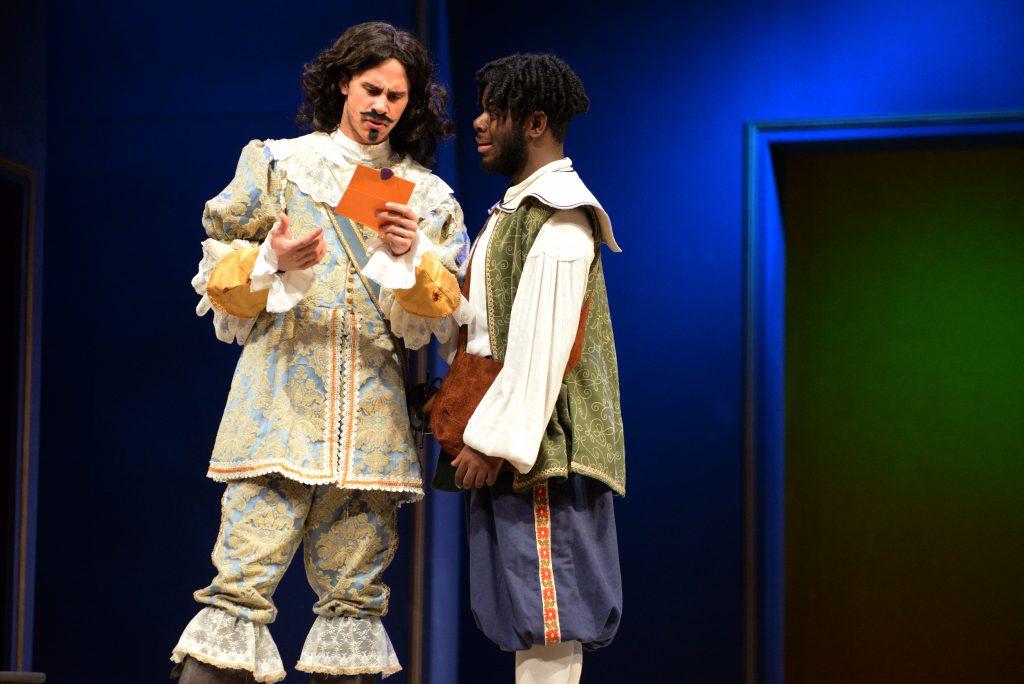
Before you even know what the play is about, the title, “The Liar,” is enough to draw you in. That’s all the show’s director, theatre professor Thomas Kremer, needed.
“Lying is pretty pervasive in our society,” Kremer said. “I was attracted to the title alone. And then I read it, and I saw it was a modern adaptation in rhyming verse. The language was so beautifully clever and funny, so I was attracted to that.”
“The Liar” is a comedic play that tells the story of Dorante, played by Trey Santiago, a senior majoring in theatre. A French nobleman who has recently moved to Paris in 1643, Dorante cannot help but lie every chance he gets to achieve his goals — and his goals typically include seducing women. His false stories create a tangled web of lies that leads to a number of humorous interactions with the other characters.
“Ah Paris, how I love you. Jesus, it’s fast here. At this rate I don’t see how I can last here. I’ve just arrived, I haven’t any pull, and look, my calendar’s already full,” Dorante says in one scene. “Fess up, are any of you quick as I, the master of the airtight alibi?”
The line is not only spoken in rhymed verse, but is also in iambic pentameter — a verse that consists of five pairs of stressed and unstressed syllables. The play is written mostly in this way, giving it a much more poetic feeling than the average theatre piece. As you can imagine, it creates a much more difficult job for the performers, who must ensure the unnatural dialogue has a natural tone and delivery.
“I think the biggest challenge is making the language work,” Kremer said. “Finding a way to do the verses so it doesn’t sound singsongy, and at the same time it makes sense.”
Adapted from Pierre Corneille’s “Le Menteur,” “The Liar” is playwright David Ives’ 2010 take on the 1644 play. There is another layer of influence, too: Corneille drew his inspiration from Mexican-born playwright Juan Ruiz de Alarcón’s “La verdad sospechosa.” In an interview with NPR, Ives said he considers what he did as a “translaptation” — part translation, part adaptation. Because Ives revamped the play so recently, it’s full of modern references to entertain a 21st-century audience.
Kremer said the theatre department puts on a similar “language play” in its Mainstage series every year. In these plays, the language is purposefully different and more difficult. According to the show’s stage manager, Rich Vollmer, ‘06, a production like this requires a lot of work.
“We’ve been rehearsing around five weeks,” Vollmer said. “We rehearse Monday through Saturday, where we typically run for four hours during the weekdays and a six-hour rehearsal on the Saturday.”
The play is romantic and poetic, but most of all, it’s funny. Much of the humor comes from the larger-than-life performances, the humorous dialogue and the meta jokes throughout the show.
“The first thing I hope people take away from the show is that they have a hell of a good time laughing,” Kremer said. “But my second thing that I hope they take away from the show is the question about lying and how does lying fit into their lives, if it fits in at all. Do they tell little white lies or do they tell big lies? Our job in the theater is to raise questions and make morals.”
“The Liar” will be performed at 8 p.m. on Feb. 23, 24, 28 and March 1, and at 2 p.m. on Feb 24. All performances will be held in Watters Theater in the Anderson Center. Tickets can be purchased at the Anderson Center Box Office or on the Anderson Center website. Prices are $18 for general audience, $16 for alumni, faculty, seniors and staff and $10 for students.


